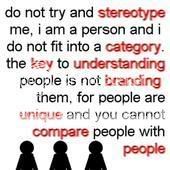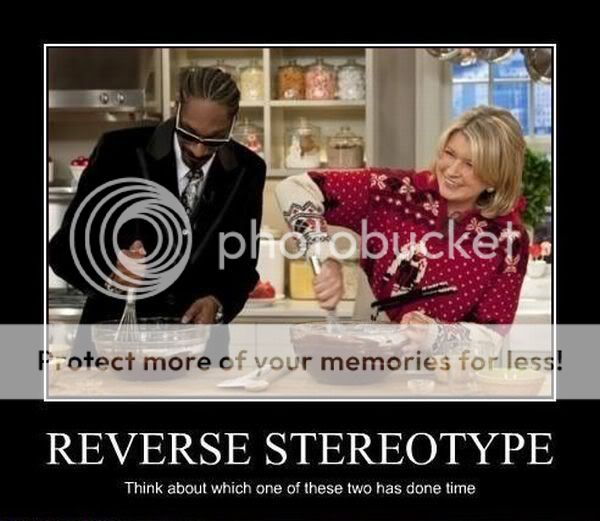STEREOTYPING INDIVIDUALS22:20 Apr 09 2011
Times Read: 674

Because apparently we could all use a lesson.
Stereotyping and assuming things about people are negative carryovers from our more primitive historical beginnings. Survival in a hostile environment was necessary. Simple assumptions gave us the "better safe than sorry" approach to dealing with one another.
Stereotyping people has no place in a modern, civilized, society and can be overcome with some careful attention.
Description
Stereotypes are generalizations about a group of people whereby we attribute a defined set of characteristics to this group. These classifications can be positive or negative, such as when various nationalities are stereotyped as friendly or unfriendly.
It is easier to create stereotypes when there is a clearly visible and consistent attribute that can easily be recognized. This is why people of color, police and women are so easily stereotyped.
People from stereotyped groups can find this very disturbing as they experience an apprehension (stereotype threat) of being treated unfairly.
We change our stereotypes infrequently. Even in the face of disconfirming evidence, we often cling to our obviously-wrong beliefs. When we do change the stereotypes, we do so in one of three ways:
1. Bookkeeping model: As we learn new contradictory information, we incrementally adjust the stereotype to adapt to the new information. We usually need quite a lot of repeated information for each incremental change. Individual evidence is taken as the exception that proves the rule.
2. Conversion model: We throw away the old stereotype and start again. This is often used when there is significant disconfirming evidence.
3. Subtyping model: We create a new stereotype that is a sub-classification of the existing stereotype, particularly when we can draw a boundary around the sub-class. Thus if we have a stereotype for Americans, a visit to New York may result in us having a ‘New Yorkers are different’ sub-type.
We often store stereotypes in two parts. First there is the generalized descriptions and attributes. To this we may add exemplars to prove the case, such as 'the policeman next door'. We may also store them hierarchically, such as 'black people', 'Africans', 'Ugandans', 'Ugandan military', etc., with each lower order inheriting the characteristics of the higher order, with additional characteristics added.
Stereotyping can go around in circles. Men stereotype women and women stereotype men. In certain societies this is intensified as the stereotyping of women pushes them together more and they create men as more of an out-group. The same thing happens with different racial groups, such as 'white/black' (an artificial system of opposites, which in origin seems to be more like 'European/non-European').
Stereotyping can be subconscious, where it subtly biases our decisions and actions, even in people who consciously do not want to be biased.
Stereotyping often happens not so much because of aggressive or unkind thoughts. It is more often a simplification to speed conversation on what is not considered to be an important topic.
Example
Stereotyping goes way beyond race and gender. Consider conversations you have had about people from the next town, another department in your company, supporters of other football teams, and so on.
So what?
Using it
Find how others stereotype you (if possible, getting them to stereotype you positively). They will have a blind spot to non-stereotyped behaviors, so you can do these and they will often ignore it. Thus if you are stereotyped as a ‘kind old man’, you can do moderately unkind things which may be ignored.
Defending
To change a person’s view of your stereotype, be consistently different from it. Beware of your own stereotyping blinding you to the true nature of other individuals.
Stereotyping can be reduced by bringing people together. When they discover the other people are not as the stereotype, the immediate evidence creates dissonance that leads to improved thoughts about the other group.
How to Stop Stereotyping People
1. Consider that stereotyping doesn't substitute for cold hard facts about people. Start by looking at how many times people said things about you that weren't true. Analyze how they based their comments about you on assumptions they had about the group of people of which you were a part, perhaps.
2. Think back at a time you were guilty of stereotyping someone. Ask yourself how true your assumptions where when you finally got to know the individual whom you stereotyped. Chances are that your assumptions were proven wrong.
3. Determine what causes you to apply the stereotyping criterion that you use. For example, not all conservatives are religious, nor do all liberals want higher taxes. Understand that there are always several empirical facts that prove your stereotyping reasons wrong. Attempt to rid yourself of prejudices and biases that lead you to stereotyping people.
4. Adopt logic, critical thinking and application of actual facts in place of stereotyping people. Let people prove themselves to you. Let them define themselves. This gives better, more accurate data on someone than what you get when stereotyping them. For example, don't assume that the bookworm is a boring person.












COMMENTS
-
xSweettoothx
22:28 Apr 09 2011
I love you sister. (I am not stereotyping you when I say that either.) :P :D
MySleepyGrenade
02:37 Apr 10 2011
Thanks for this!
You're right, we could all use a little refresher on this :)
xVIRUSx
02:08 Apr 14 2011
Okay, I thought this was going to be different. I totally agree with this one. Everyone does it at least once in life. I'm not going to lie, yeah it bugs the shit out of me when people talk shit about me being a Lette. Truthfully they are no better than those that they are spitting at. Saying that we are uneducated, they need to get their shit before talking shit about us as a whole group. Truth is between my husband and I, we probably bring in more than they could ever dream of. It makes me laugh. But I'm not going to hide who I am because a bunch of website !@*#%$ said that they don't like me. All I can say is FUCK YOU!